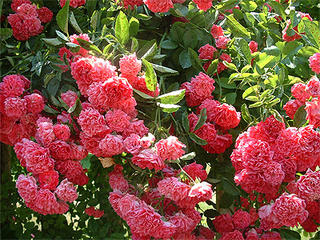Tuesday, August 23, 2005
Some brief observations

Here are lines from the poet Ghalib:
"Let the ascetics sing of the garden of Paradise --
We who dwell in the true ecstasy can forget their vase-tamed bouquet"
Ghalib
(1797 - 1869)
English version by Jane Hirshfield
(You can find the full text of this poem on www.poetry-chaikhana.com )
These lines offer a lovely metaphor for the experience of the ecstatic as opposed to that of the ascetic. The ecstatic seeks a wild joy (kundalini?), and seeks his/her god with an intent of passion. She unleashes the senses in order to experience the divine in its full flavor. (I am not speaking here of orgiastic or chaotic experience--rather a reclaiming of our inner birthright of joyous feeling.) The ascetic wishes to control the senses--to repress them in order to purify the self and make it acceptable for divine favor.
And here is another thought, a remark made by a friend yesterday: "There is no dark night of the soul...only the dark night of the ego."
There is much truth to that statement. It gives one much to ponder. Often, it is indeed ego which is clinging to or creating circumstances to maintain its own self-important role. But, I would have to add that sometimes, when great tragedy occurs, there is a night in which the soul indeed seems darkened--the occasion is not of our own making, but comes from external circumstances over which we have no control, and a sense of deep grief or despondency is an appropriate response. The feelings must not be repressed but acknowledged for healing to occur.
A final note: I have thought at length about the relationship of bliss and compassion. I recently visited the current exhibit of Tibetan Buddhist art at the S. F. Asian Art Museum. On display was the familiar depiction in statue form of the god and goddess in union, interpreted as the perfect union of bliss (masculine) and profound emptiness (feminine.) Again, in another display, the famed sacred bell (feminine) is interpreted as "emptiness and perfect wisdom" while the companion instrument (the vajra or thunderbolt--masculine) embodies bliss and the universal compassion that frees all beings from misery.
I think this connection is important. Bliss is thus not merely a narcissistic diversion, but an active companion and possibly even a component of compassion. That bliss which is experienced as a gift of the divine can (and should, I think) become an offering to all in need, to all sentient beings, just as a quiet sitting meditation might be. There is no need to shun bliss. It is part of our acceptance of our own place in the divine scheme, to acknowledge that we too can receive and give unconditional love.
